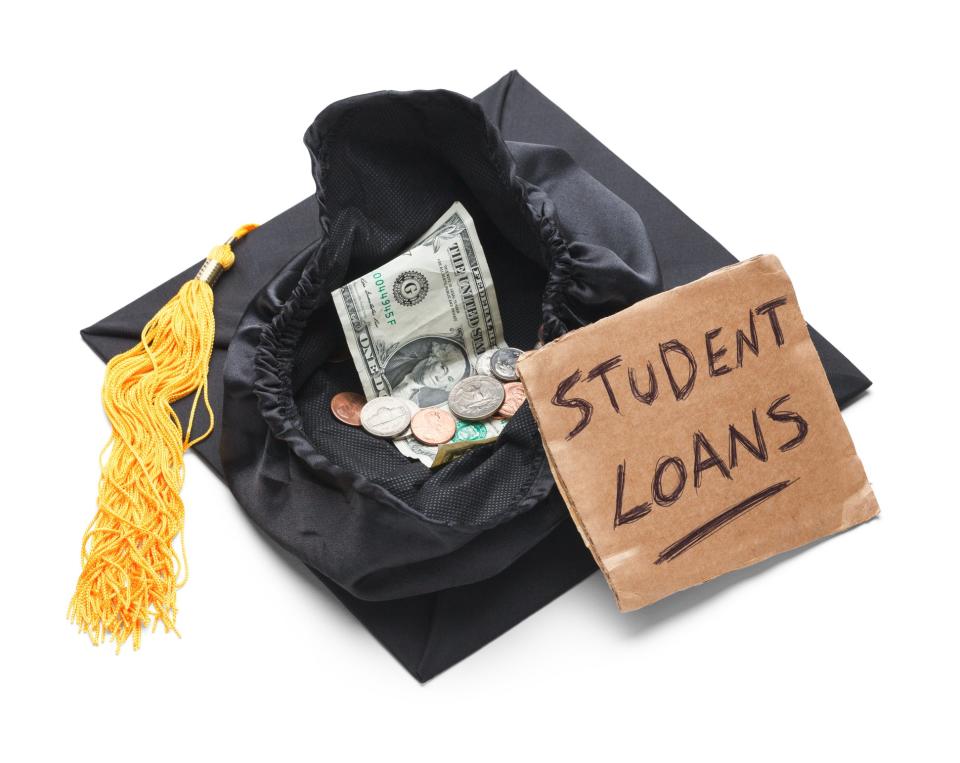Graduating in 2019? 4 Ways to Get Ahead of Your Student Loans
Student debt doesn’t have to drag you down for years on end. Here’s how to attack those loans head-on.

Image source: Getty Images
If you graduated college with a mountain of student debt, you’re in good company. Roughly 45 million Americans are carrying debt from student loans, many of whom are in their 40s, 50s, or older.
Of course, you really don’t want that to happen to you. In fact, you’re probably eager to shed that debt as quickly as possible, even if it means making some financial sacrifices when you’re first starting out in the working world. Here’s how you can get a jumpstart on paying back your student loans.
1. Put your graduation gifts to good use
If your family members and friends were generous with graduation gifts, and were smart enough to dish them out in cash form, you have a prime opportunity to make a serious dent in your student loan balance right off the bat.
Imagine you graduated college $30,000 in debt, and that you're supposed to pay off your loans over a 10-year period at 8% interest. If you were to stick to that schedule, you'd wind up spending nearly $13,700 on interest alone, and you'd be looking at a loan payoff date of May 2029. On the other hand, if you were to apply $1,000 in graduation gifts to your student loans, you'd save yourself about $1,200 in interest and pay off your loan balance five months ahead of schedule.
2. Move back home
Moving in with your parents can be a bummer, especially if you spent four years of college living on your own. But if doing so allows you to save money on rent and utilities, it’s worth sacrificing a little freedom.
Imagine that by living at home for a year, you're able to save $800 a month on rent and utilities for a total of $9,600. Now imagine that a year into your loan payments, you apply that $9,600 to your outstanding balance. In doing so, you'll save over $7,000 on interest over the life of your loan, and you'll be out of debt by July 2025.
3. Follow a strict budget
Being mindful of how you spend your money could help you eke out extra cash on a regular basis to pay down your student loans quickly. That’s why it pays to set up a budget that maps out your recurring monthly expenses and factors in once-a-year expenses you should account for throughout the year. By listing your expenses and comparing your total spending to your take-home earnings, you’ll get a better sense of where there’s room to cut corners and scrounge up cash to apply to your loans.
Imagine you’re able to add $200 a month to your minimum student loan payment. In doing so, you'll save about $6,500 in interest, and you'll also move up your loan payoff date to November 2024.
4. Get a second job on top of your main one
Squeezing extra cash out of your budget can be challenging, especially when you’re a recent grad earning an entry-level salary. That’s where a side hustle can come in handy. The beauty of working that second gig is that your earnings from it won’t already be earmarked for living expenses, and as such, you should be able to use all of them to chip away at your loan balance.
Imagine you do some side work on a few companies’ websites your first year out of school, and that you find yourself with an extra $3,000 as a result. If you were to apply that $3,000 to your loan balance, you'd save almost that much in interest alone, all the while getting yourself out of debt by February 2028 instead of May 2029.
Getting ahead of your student loans is easier said than done, but if you want to shake that debt as quickly as possible, you’ll need to make the effort. As you adjust to life outside of college, be mindful of the impact your student debt could have on your finances on a long-term basis, and push yourself to minimize that burden as much as you can.
The Motley Fool owns and recommends MasterCard and Visa, and recommends American Express. We’re firm believers in the Golden Rule. If we wouldn’t recommend an offer to a close family member, we wouldn’t recommend it on The Ascent either. Our number one goal is helping people find the best offers to improve their finances. That is why editorial opinions are ours alone and have not been previously reviewed, approved, or endorsed by included advertisers. Editorial content from The Ascent is separate from The Motley Fool editorial content and is created by a different analyst team.

